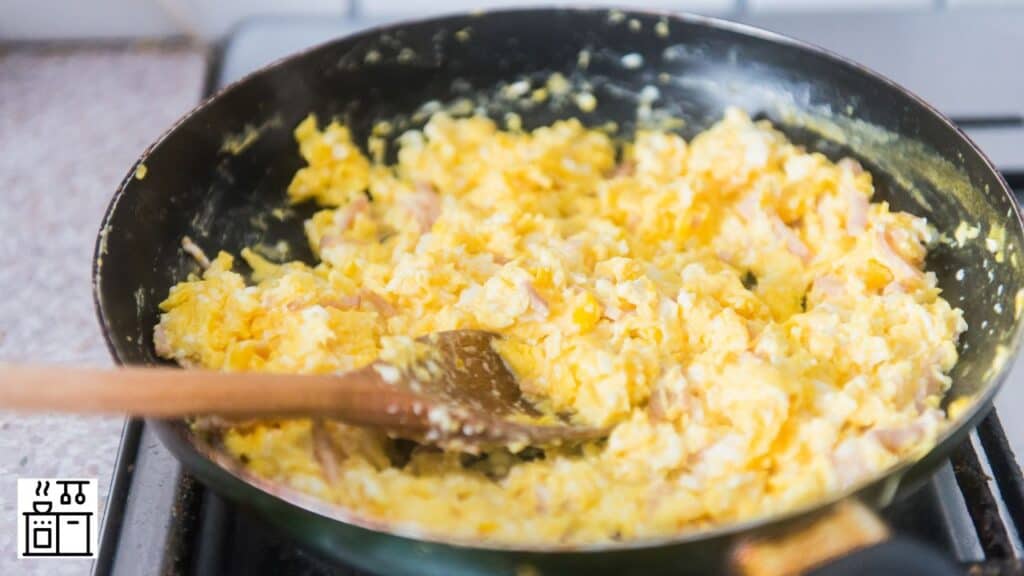Scrambled eggs turn grey due to the chemical reaction that occurs when they are exposed to high temperatures or overcooked. The sulfur in the egg whites and the iron in the egg yolks react with the heat, forming a compound known as ferrous sulfide (iron sulfide), which imparts a greyish color.
Moreover, proteins in the egg whites can oxidize when they come into contact with oxygen, further contributing to discoloration.
Let’s talk about this in more detail now.
What Are the Common Causes of Grey Scrambled Eggs?
Let’s now look at the various reasons why scrambled eggs turn grey.
You’ll find out not only the reasons behind this unappetizing color change but also how to avoid it and ensure your scrambled eggs come out perfectly every time.
How Does Overcooking Lead to Grey Scrambled Eggs?
When you’re overcooking scrambled eggs, it triggers a chemical reaction between the sulfur in the egg whites and the iron in the egg yolks, leading to a greyish color.
This color change is due to the formation of ferrous sulfide, a compound that gives scrambled eggs a grey color.
How Does Cooking in Iron Utensils Cause Grey Scrambled Eggs?
You’re probably wondering why cooking with iron utensils causes your scrambled eggs to take on a less-than-appetizing color.
Well, it’s all about a little chemical reaction that happens when your eggs meet your favorite cast iron skillet.
The sulfur in the egg whites and the iron in the skillet heat up and form a compound called ferrous sulfide.
This is the culprit behind those grey scrambled eggs. It’s more likely to happen when you crank up the heat or cook your eggs for too long.
How Does Prolonged Exposure to Heat Cause Scrambled Eggs to Turn Grey?

Prolonged cooking of scrambled eggs at high temperatures causes a chemical reaction in the eggs, leading them to turn grey.
When you cook your scrambled eggs for too long, the sulfur in the egg whites and the iron in the yolks combine to form ferrous sulfide. This compound is responsible for the off-putting grey color.
The heat also causes the proteins in the egg whites to denature, a process where they unravel and start sticking to each other.
This not only affects the color but also the texture, making your eggs grey and dry.
How Do Proteins in Egg Whites Cause Scrambled Eggs to Turn Grey?
Proteins in egg whites oxidize and take on a brownish hue, which can make your scrambled eggs look less appealing.
When these proteins are exposed to oxygen, particularly during cooking, they undergo a chemical reaction. This reaction changes their color from a pleasing yellowish-white to an unappetizing grey-brown.
It’s more noticeable when you overcook your scrambled eggs or cook them at high temperatures for a long time.
Don’t worry, though, your breakfast isn’t ruined. You can prevent this from happening.
Simply cook your scrambled eggs at a medium-low temperature and avoid overcooking. That way, you’ll keep the proteins happy and your eggs looking appetizing.
To sum up…
| Action | Result |
|---|---|
| Overcooking | Proteins unravel and stick together |
| Sulfur in whites reacts with iron in yolks | Formation of ferrous sulfide |
| High heat exposure | Denature of proteins |
| Formation of ferrous sulfide | Greyish color |
How to Prevent Scrambled Eggs from Turning Grey?
Cranking up the heat may seem like a quick way to whip up breakfast, but it’s actually a surefire way to overcook your eggs, triggering a chemical reaction that’ll turn them grey. So, take your time and keep the heat low.
However, it’s not just about temperature. The type of pan you use can also affect the color of your eggs
Iron utensils, like cast iron skillets or aluminum pans, can cause a chemical reaction with the eggs, causing them to turn grey. So, stick to non-stick or stainless steel pans to keep things golden.
Now, onto portion size. You might think cooking a big batch of scrambled eggs is a time-saver, but it can lead to overcooking and, you guessed it, grey eggs.
Cook smaller batches instead. This way, you’ll have better control over the cooking process, preventing that unappetizing grey color.
Finally, let’s talk about oxygen exposure. The proteins in egg whites can oxidize when exposed to air, turning your eggs grey.
So, crack, whisk, and cook those eggs promptly, avoiding leaving them exposed to air for too long.

